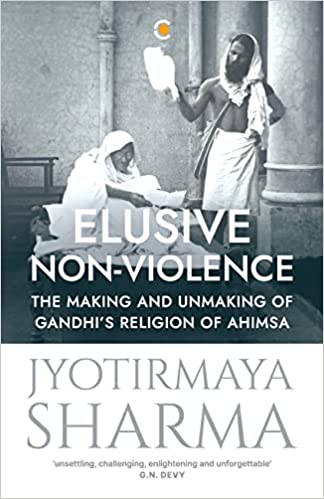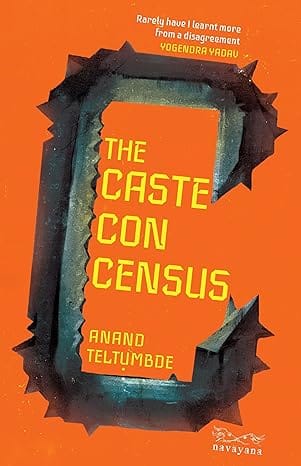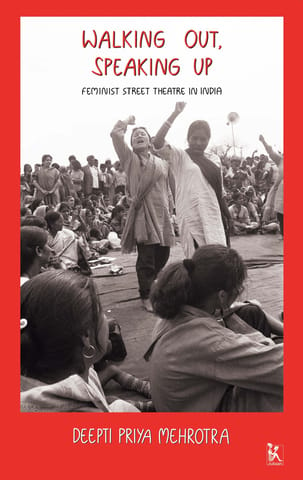WELCOME TO MIDLAND BOOK SHOP!
SHOP FOR
- Non-ficton
- Non-ficton
- Contemporary Fiction
- Contemporary Fiction
- Children
- Children
- Comics & Graphic Novels
- Comics & Graphic Novels
- Non-Fiction
- Non-Fiction
- Fiction
- Fiction
Shop No.20, Aurobindo Palace Market, Hauz Khas, Near Church +91 9818282497 | 011 26867121 110016 New Delhi IN
Midland The Book Shop ™
Shop No.20, Aurobindo Palace Market, Hauz Khas, Near Church +91 9818282497 | 011 26867121 New Delhi, IN
+919871604786 https://www.midlandbookshop.com/s/607fe93d7eafcac1f2c73ea4/677cda367903fd013d69b606/without-tag-line-480x480.png" [email protected]9789395767682 63c148f3f0c71200192b297d Elusive Non-violence The Making And Unmaking Of Gandhis Religion Of Ahimsa https://www.midlandbookshop.com/s/607fe93d7eafcac1f2c73ea4/63c148f4f0c71200192b29eb/41mhw85g5ul-_sx322_bo1-204-203-200_.jpg 9789395767682
About the Book
VIOLENCE AND NON-VIOLENCE SEEN THROUGH THE GANDHIAN PRISM
Gandhi and non-violence are ubiquitous. But what was the precise nature of that definition as it played out in Gandhi’s own life and politics? The same man who spoke of turning the other cheek responded sympathetically to Hitler’s rule of Jewish annihilation. The ascetic who had few material needs and personified gentleness was remorseless in his need for complete obedience from his own family. What then constituted his notion of ahimsa? Where lay its genesis and how did his idea of peaceful protest become the central point of the national movement?
Chronicling Gandhi’s journey through the fire of experience to initiate his most unflinching mission, the restatement of Hinduism, Jyotirmaya Sharma reopens the debate around ahimsa and its continued relevance—or irrelevance—in the modern world.
About the Author
Jyotirmaya Sharma is professor of political science at the University of Hyderabad, India. His other books include A Restatement of Religion: Swami Vivekananda and the Making of Hindu Nationalism; Terrifying Vision: M.S. Golwalkar, the RSS and India and an edited volume titled Grounding Morality: Freedom, Knowledge and the Plurality of Cultures (co-edited with A. Raghuramaraju). He has been a visiting fellow and lecturer at many prestigious universities and research centres, both in India and abroad. He has also held senior editorial positions at The Times of India and The Hindu,/i> from 1998–2006, and continues to write occasional columns.
VIOLENCE AND NON-VIOLENCE SEEN THROUGH THE GANDHIAN PRISM
Gandhi and non-violence are ubiquitous. But what was the precise nature of that definition as it played out in Gandhi’s own life and politics? The same man who spoke of turning the other cheek responded sympathetically to Hitler’s rule of Jewish annihilation. The ascetic who had few material needs and personified gentleness was remorseless in his need for complete obedience from his own family. What then constituted his notion of ahimsa? Where lay its genesis and how did his idea of peaceful protest become the central point of the national movement?
Chronicling Gandhi’s journey through the fire of experience to initiate his most unflinching mission, the restatement of Hinduism, Jyotirmaya Sharma reopens the debate around ahimsa and its continued relevance—or irrelevance—in the modern world.
About the Author
Jyotirmaya Sharma is professor of political science at the University of Hyderabad, India. His other books include A Restatement of Religion: Swami Vivekananda and the Making of Hindu Nationalism; Terrifying Vision: M.S. Golwalkar, the RSS and India and an edited volume titled Grounding Morality: Freedom, Knowledge and the Plurality of Cultures (co-edited with A. Raghuramaraju). He has been a visiting fellow and lecturer at many prestigious universities and research centres, both in India and abroad. He has also held senior editorial positions at The Times of India and The Hindu,/i> from 1998–2006, and continues to write occasional columns.
Review
‘In the vast library of Gandhiana, Jyotirmaya Sharma’s book stands out for its subtle and lucid insights into the inner dynamics of Gandhian non-violence. His reading of Gandhi’s evolving theory of ahimsa and satyagraha reveals the often paradoxical, sometimes contradictory, and indeed elusive nature of these concepts. Particularly engaging is Sharma’s explication of the three major commentaries that Gandhi spoke and wrote on the Bhagavadgita (two of them in Gujarati, thus not easily accessible to the wider scholarly community). Many surprises and riddles await the readers of this refreshing book.’ — DAVID SHULMAN
‘Superbly researched and nuanced, Jyotirmaya Sharma’s depiction of the evolution of Mahatma Gandhi’s unprecedented formulation of non-violence, primarily political and ultimately philosophical, makes the book unsettling, challenging, enlightening and unforgettable. A major contribution to Gandhi studies and, more importantly, to political philosophy.’ — G.N. DEVY
‘Superbly researched and nuanced, Jyotirmaya Sharma’s depiction of the evolution of Mahatma Gandhi’s unprecedented formulation of non-violence, primarily political and ultimately philosophical, makes the book unsettling, challenging, enlightening and unforgettable. A major contribution to Gandhi studies and, more importantly, to political philosophy.’ — G.N. DEVY
About the Author
Jyotirmaya Sharma is professor of political science at the University of Hyderabad, India. His other books include A Restatement of Religion: Swami Vivekananda and the Making of Hindu Nationalism; Terrifying Vision: M.S. Golwalkar, the RSS and India and an edited volume titled Grounding Morality: Freedom, Knowledge and the Plurality of Cultures (co-edited with A. Raghuramaraju). He has been a visiting fellow and lecturer at many prestigious universities and research centres, both in India and abroad. He has also held senior editorial positions at The Times of India and The Hindu from 1998–2006, and continues to write occasional columns.
out of stock INR 399
1 1
Email ID already exists!
Your Current password is incorrect
Password Updated Successfully
Thanks for your Feedback
- Home
- Non-Fiction
- Elusive Non-violence The Making And Unmaking Of Gandhis Religion Of Ahimsa
Elusive Non-violence The Making And Unmaking Of Gandhis Religion Of Ahimsa
ISBN: 9789395767682
₹399
₹499 (20% OFF)SIZE GUIDE
Back In Stock Shortly - Fill The Book Request Form
Sold By: Hauz Khas - Aurobindo Market
Details
- ISBN: 9789395767682
- Author: Jyotirmaya Sharma
- Publisher: Westland
- Pages: 280
- Format: Paperback
Book Description
About the Book
VIOLENCE AND NON-VIOLENCE SEEN THROUGH THE GANDHIAN PRISM
Gandhi and non-violence are ubiquitous. But what was the precise nature of that definition as it played out in Gandhi’s own life and politics? The same man who spoke of turning the other cheek responded sympathetically to Hitler’s rule of Jewish annihilation. The ascetic who had few material needs and personified gentleness was remorseless in his need for complete obedience from his own family. What then constituted his notion of ahimsa? Where lay its genesis and how did his idea of peaceful protest become the central point of the national movement?
Chronicling Gandhi’s journey through the fire of experience to initiate his most unflinching mission, the restatement of Hinduism, Jyotirmaya Sharma reopens the debate around ahimsa and its continued relevance—or irrelevance—in the modern world.
About the Author
Jyotirmaya Sharma is professor of political science at the University of Hyderabad, India. His other books include A Restatement of Religion: Swami Vivekananda and the Making of Hindu Nationalism; Terrifying Vision: M.S. Golwalkar, the RSS and India and an edited volume titled Grounding Morality: Freedom, Knowledge and the Plurality of Cultures (co-edited with A. Raghuramaraju). He has been a visiting fellow and lecturer at many prestigious universities and research centres, both in India and abroad. He has also held senior editorial positions at The Times of India and The Hindu,/i> from 1998–2006, and continues to write occasional columns.
VIOLENCE AND NON-VIOLENCE SEEN THROUGH THE GANDHIAN PRISM
Gandhi and non-violence are ubiquitous. But what was the precise nature of that definition as it played out in Gandhi’s own life and politics? The same man who spoke of turning the other cheek responded sympathetically to Hitler’s rule of Jewish annihilation. The ascetic who had few material needs and personified gentleness was remorseless in his need for complete obedience from his own family. What then constituted his notion of ahimsa? Where lay its genesis and how did his idea of peaceful protest become the central point of the national movement?
Chronicling Gandhi’s journey through the fire of experience to initiate his most unflinching mission, the restatement of Hinduism, Jyotirmaya Sharma reopens the debate around ahimsa and its continued relevance—or irrelevance—in the modern world.
About the Author
Jyotirmaya Sharma is professor of political science at the University of Hyderabad, India. His other books include A Restatement of Religion: Swami Vivekananda and the Making of Hindu Nationalism; Terrifying Vision: M.S. Golwalkar, the RSS and India and an edited volume titled Grounding Morality: Freedom, Knowledge and the Plurality of Cultures (co-edited with A. Raghuramaraju). He has been a visiting fellow and lecturer at many prestigious universities and research centres, both in India and abroad. He has also held senior editorial positions at The Times of India and The Hindu,/i> from 1998–2006, and continues to write occasional columns.
Review
‘In the vast library of Gandhiana, Jyotirmaya Sharma’s book stands out for its subtle and lucid insights into the inner dynamics of Gandhian non-violence. His reading of Gandhi’s evolving theory of ahimsa and satyagraha reveals the often paradoxical, sometimes contradictory, and indeed elusive nature of these concepts. Particularly engaging is Sharma’s explication of the three major commentaries that Gandhi spoke and wrote on the Bhagavadgita (two of them in Gujarati, thus not easily accessible to the wider scholarly community). Many surprises and riddles await the readers of this refreshing book.’ — DAVID SHULMAN
‘Superbly researched and nuanced, Jyotirmaya Sharma’s depiction of the evolution of Mahatma Gandhi’s unprecedented formulation of non-violence, primarily political and ultimately philosophical, makes the book unsettling, challenging, enlightening and unforgettable. A major contribution to Gandhi studies and, more importantly, to political philosophy.’ — G.N. DEVY
‘Superbly researched and nuanced, Jyotirmaya Sharma’s depiction of the evolution of Mahatma Gandhi’s unprecedented formulation of non-violence, primarily political and ultimately philosophical, makes the book unsettling, challenging, enlightening and unforgettable. A major contribution to Gandhi studies and, more importantly, to political philosophy.’ — G.N. DEVY
About the Author
Jyotirmaya Sharma is professor of political science at the University of Hyderabad, India. His other books include A Restatement of Religion: Swami Vivekananda and the Making of Hindu Nationalism; Terrifying Vision: M.S. Golwalkar, the RSS and India and an edited volume titled Grounding Morality: Freedom, Knowledge and the Plurality of Cultures (co-edited with A. Raghuramaraju). He has been a visiting fellow and lecturer at many prestigious universities and research centres, both in India and abroad. He has also held senior editorial positions at The Times of India and The Hindu from 1998–2006, and continues to write occasional columns.
User reviews
NEWSLETTER
Subscribe to get Email Updates!
Thanks for subscribing.
Your response has been recorded.

India's Iconic & Independent Book Store offering a vast selection of books across a variety of genres Since 1978.
"We Believe In The Power of Books" Our mission is to make books accessible to everyone, and to cultivate a culture of reading and learning. We strive to provide a wide range of books, from classic literature, sci-fi and fantasy, to graphic novels, biographies and self-help books, so that everyone can find something to read.
Whether you’re looking for your next great read, a gift for someone special, or just browsing, Midland is here to make your book-buying experience easy and enjoyable.
We are shipping pan India and across the world.
For Bulk Order / Corporate Gifting
 +91 9818282497 |
+91 9818282497 |  [email protected]
[email protected]
Click To Know More
INFORMATION
QUICK LINKS
ADDRESS
Midland Book Shop - Hauz Khas
Shop No.20, Aurobindo Palace Market, Near Church, New Delhi
Shop No.20, Aurobindo Palace Market, Near Church, New Delhi














